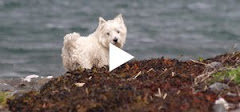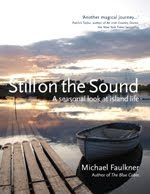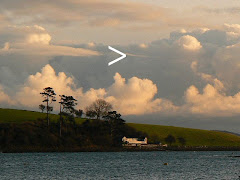Yesterday there was a full moon, although for most of the evening you wouldn't know it because Strangford Lough was blanketed in thick fog – our nearest neighbour on the mainland asked us over for a meal later in the week, and said that before calling, she had taken a quick look from her window to see whether the cabin lights were on in the distance. Nothing.
Come midnight, Lynn and I turned in, and as always I looked over the sound to check that all was well with the boats. I couldn't see as far as the dinghy on the mooring, and even to check the rowing boat I had to walk down the jetty. I was more or less beside it before I saw it – or more correctly, the tip of the bow poking out of the water at a steep angle, like an orca surfacing for air. The stern had somehow drifted under the jetty, and the incoming tide had done the rest. Lynn suggested leaving it where it was and baling it out first thing in the morning when the ebb tide had left it high and dry. A sensible suggestion, as it's quite a lot of work heaving the boat into the shallows and getting it refloated; but I could see that the oars were gone, and I had the foolish notion that it might be worth taking the rowing boat for a quick look, using a spare pair of oars from the shed.
Fast forward half an hour. The boat is floating, the tide has come in another ten or twelve feet; the fog is as thick as ever. I tied the bow line to the jetty, and took a torch along the foreshore in both directions, in case the oars had drifted ashore. To be honest, I could have tripped over them before seeing them, as the torch was throwing up a moveable wall of reflected light in front of me as I stumbled along, and I could see very little. So I fetched the spare oars and rowed the boat out to the point where it had sunk an hour or two before. The surface of the water was like glass, which would have been auspicious had it not been for the fog – when there is no wave, you can make out a length of wood at quite a distance, even in the dark, as long as there is a moon. However, nothing ventured... I put needles and haystacks out of my mind and stopped the boat dead in the water when I reckoned I was directly over the jetty. My plan was to discover in which direction the boat would begin to drift, and to row backwards (so as to see where I was going) in that same direction. It's a curiosity of our part of Ringhaddy Sound that the tidal movement at around half-tide is exactly opposite to what you would expect: water is flooding into the lough from the Irish Sea, south to north, but although the tidal stream in mid-sound is south-north as you'd expect, close inshore on the cabin side, it's north-south. I've never discovered why. Anyway, the rowing boat slowly began drifting just west of south, and after giving it five minutes, I took up the oars and gave it a hand.
It was perfectly still, and the fog was starting to lift. I could hear a fox somewhere to the east, probably on Pawle Island – I don't know whether foxes howl at the full moon, but that's for all the world what it sounded like. The more the moon revealed itself, the more surreal my situation felt. Every rasp and click of the rowlocks was profoundly amplified, and for some reason I started placing the blades in the water with great precision on every stroke, so as not to disturb the night. I was too far south for mooring buoys, but I did make out the marker buoy at the south entrance to Ringhaddy Sound as I slid silently past. Then quite suddenly, as it seemed to me, the moon emerged, sharp-edged, clear and bright, and for the first time I was able to see the silhouette of the trees on the mainland.
If the errant oars hadn't shown a little gleam as I approached, I would probably have hit them. They were lying, one on top of the other, in the form of a perfect 'X', halfway across the sound and a little to the south of Eagle Point. As I lifted them aboard, I began to laugh – surreal enough in itself I suppose – and for a moment my heart, as they say, was full.
That's it. For me, this happy conclusion felt disproportionately significant, as I shall try to explain.
Ten days ago, we managed a celebratory thanksgiving service for my mother. The Salvation Army, with which she had a long association and whose up-tempo music she appreciated almost as much as their practical approach to the business of doing good within a Christian framework, provided the musical accompaniment; all the family took part; and several times the congregation laughed and clapped spontaneously, which will have delighted her heart. The minister was most generous in allowing the family more or less free rein, and gave an inspiring sermon himself.
My sister Claire introduced us as we went along, with anecdotes and commentary, which Mum will have enjoyed; David provided a lovely tribute/biography combined, which left all of us wondering how on earth she had fitted it all in; Lucinda and Jamie chose readings which both – no surprise – nodded affectionately in the direction of Mum's abiding love of horses; and for what it's worth, this is the text of what I had to say myself:-
"We’ve heard about Mum’s career, and how much she contributed to public life, and of course we’ve also been thinking a lot about her abiding character traits. They included her steely determination; her way of making people feel that everything was about them and not her; enormous wisdom; and an unfailing sense of humour, even in a crisis. 'Character', in fact, is the operative word.
It probably goes without saying that for us as a family, her greatest quality was total love and dedication, but I thought a couple of little illustrations might show her interest in people generally and her ability to make a person feel special. Sometime during her antiquarian book dealing days, I think she would have been in her mid seventies, she asked me to collect a book from a very nice book dealer who had a little shop at the bottom of Dundas Street in Edinburgh – I can’t remember his name – so I popped in. As I was leaving he said, ‘Your mother is a most remarkable and intelligent woman. We’ve had some great conversations over the years.’ And I can just see her standing in the shop, chatting away, because she would have been genuinely interested in the man, and the shop, and the books – the conversations could have gone anywhere but she would have been in no hurry to leave, even if she was in a hurry; and that’s the impression she made on him. I think it was quite telling, and the theme has been repeated again and again during the last few years, as Mum and I replied to various correspondents together – there were obviously many, many people out there, not necessarily with more than a passing acquaintance, who counted her as an old friend.
It would take too long to give examples of all the facets of her amazing personality, but because I’ve had the rare privilege, for a fifty-something year old son, of spending so much time with Mum in the last six or seven years, I would like to mention one particular quality, which I think probably shone as a beacon throughout her life, given the knocks she has taken – and recovered from. I mean her ability to get up and get on, which of course is closely allied to making the most of things, and to having in your armoury a ready sense of humour.
Mum had a ridiculous habit which caused great hilarity over the years, when she was thinking of reading a book, of going to the last page first, just to check that it had a satisfactory ending. Unbelievable but true! She absolutely insisted on a happy ending and I think it reflected her natural inclination to strive for a positive outcome in all of life’s situations: family, professional, political, whatever – albeit along the way she tended to sketch out the worst case scenario just to insure against disappointment. The outcome was always the same – forward-looking and with a smile, or more often a laugh.
Years ago, on a Christmas evening, we all sat down to watch a film. The ideal thing would have been It’s a Wonderful Life, but I had seen that Butch Cassidy and the Sundance Kid was on, and I said it was a great film. She would enjoy it. Now, Butch Cassidy ends with the heroes going out in a blaze of glory and a hail of bullets, and as the credits rolled, Mum turned to me and shook her head and laughed and said, ‘That is the last time I’m going to take a recommendation from you…’ She never let me forget it, and for ever after, when I suggested a film, she would throw her eyes to heaven and give me an old-fashioned look and say, ‘Oh yes, Butch Cassidy and the Sundance Kid!’
Her preference was for Bergerac, or Poirot, where you knew the protagonist would return, and everything would be neatly and positively resolved. She and our father were very much alike in this respect; it’s just that Da used to arrive at the same positive outcome by a more direct route. If they were discussing something or working up a speech, Mum would look at all the angles and write it all down – she was such a gifted writer [here I showed the congregation an exercise book of her handwritten short stories, and mentioned that a couple of people from my publishers were in the church..] – but Da would assimilate it all into his own thinking… and then cut to the chase. It was one of the many ways in which they made such a wonderful team. By way of illustration, this is what I would call Mum’s version of what I’m saying today [I held up two or three sheets of densely-typed A4]; whereas this is my father’s.. [bullet points on one side of an index card]
As to her sheer willpower and grit, her get up and go, when Mum suffered her stroke seven years ago (actually a very severe stroke) she got up and went in a very big way, and honestly, we were all in awe. A lesser person would have thought, Well that’s it as far as the future goes. But not Mum. From day one she brought her extraordinary bounce-back ability to bear, and we soon discovered, by her example, that there are a hundred ways to communicate besides old-fashioned speech, and that if you set your mind to it, and you’re always up for it, you can regain a measure of mobility on your own two feet; and a great deal more, as it turned out, in an electric wheelchair [David had mentioned how Mum drove the wheelchair in much the same way she used to drive the car – too fast]. It’s just that I would hate anyone to have the impression that Mum’s post-stroke period was all about languish, or decline, or even inactivity. There were challenges, but challenges were always Mum’s bread and butter. Obviously, all four of us, Mum, David, Claire and I joined forces to tackle the difficulties together, but Mum made sure she continued to play an active part in everything the family was doing. She was interested, engaged, proactive, and perennially – amazingly – cheerful. It won’t surprise anyone who knows the family, or our father, that we picnicked all over Co. Down and beyond, from cloud to sea level. She came to numerous book events. For a long time she continued to read voraciously, and I remember showing her what was to be the last chapter of my book, and she went over it and felt it was missing something or going in the wrong direction, and it took just a short to and fro session for me to understand that the emphasis was wrong, and that there was a better way of handling it. Mum picked it up right away, and her editorial eye did the rest [her career had started with a stint at the Belfast Telegraph, alongside the legendary John Cole].
Talking of the supercharged wheelchair, it always reminded Lynn and me of Mum’s visits to Scotland during her book business period. She would come over on the ferry with the car packed to the gunnels with books and shelves, and we used to have enormous fun setting up her stand at book fairs in Edinburgh and all around Scotland. Her enthusiasm for books was utterly infectious. Lynn ended up with a wonderful collection of children’s illustrated books, and I have a pretty good library on all things Western, thanks to Mum. Those visits were such great fun.
Anyway, when we saw Mum off after a week or so, she used to tear off down our lane. It was a long straight lane, and Lynn and I would stand there waving, but I’m perfectly sure that in all those years Mum never once saw us for the cloud of dust in the rear-view mirror. When she substituted the wheelchair for the car, nothing changed. In fifth gear, you couldn’t walk beside it, you had to jog, and David and Claire and some others (you know who you are) will bear me out here: Mum has taken the light from our eyes so often, I think you’ll understand when I say that there was never a dull moment when we were out and about!
Now, I hope it might be of some comfort to share with you a conversation which Mum and I had several times over the years. I’m sure she had the same conversation with David and Claire. She had pretty clear views about her own mortality. She used to say that our generation is far too preoccupied with prolonging life beyond what is reasonable; that death is very much a part of life; and that whenever the time came, she would see her own passing as a bridge to our father. Our earthly father that is, [looking at Rev David Hyndman], no disrespect to our Heavenly Father. I feel sure that when she got to heaven, she made a beeline for Da, and I’m equally sure our Heavenly Father will have been full of understanding and forbearance while she did so. It’s been a very long time [my father Brian Faulkner, Northern Ireland's last PM, was killed in a hunting accident in1977].
I just know that Mum and Da will be looking down today and saying, ‘Well we’re happy, and in due course you will be too’.
Looking to the future, as Mum would insist that we do, there are so many legacies to draw on, but if I were to choose one I would say that my mother’s is the standard against which I shall judge my efforts to pick up and get on, and to see the positive, not just today but through all the twists and turns that life is bound to offer. Unsatisfactory endings are not permitted. And she will know this, and she’ll be watching, so I’d better get it right. If I don’t, the next time we meet she will laugh and shake her head, and she’ll say, ‘What did I tell you about Butch Cassidy and the Sundance Kid?’"
Lady Faulkner of Downpatrick CBE
1925-2012
.jpg)
.jpg)














